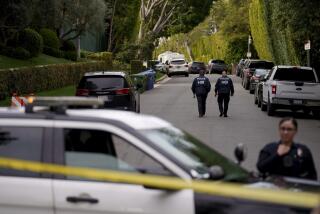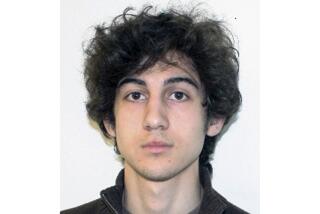Probe Ordered Into Charges by Henley Juror : Court: Brian Quihuis alleges that he was offered money to vote ‘not guilty’ in drug trafficking trial of Rams cornerback. Federal judge initiates FBI investigation.
A federal judge ordered the FBI on Thursday to investigate a juror’s allegations that Rams cornerback Darryl Henley offered him money through a former juror to vote “not guilty” in the football player’s cocaine trafficking trial.
U.S. District Judge Gary L. Taylor initiated the investigation after the juror contacted the court with the allegations of jury tampering on Wednesday--almost one month to the day after Henley and four co-defendants were convicted of drug conspiracy and possession charges in a case that shocked the football world.
The alleged bribe was for $50,000, according to a source close to the case.
Henley denied the bribery allegations Thursday during an interview from the Metropolitan Detention Center in Los Angeles, saying that the full story would come out soon.
Juror Brian Quihuis alleged that shortly before the jury began deliberating in late March, “he was contacted by former juror Michael Malachowski with an offer to accept money from Darryl Henley to vote ‘not guilty’ in the jury deliberations,” according to the order by Judge Taylor.
Quihuis said there were “various conversations on the topic, that he did not report it to the court, and that he did not accept any money,” according to the court order.
Quihuis could not be reached for comment. Malachowski, reached at his home Thursday, denied the allegations.
“That’s totally ridiculous,” he said. “That’s totally a lie.”
Judge Taylor met with prosecutors in his chambers Wednesday and Thursday before signing the order for a “complete investigation” by the FBI.
Prosecutors with the U.S. attorney’s office declined to comment.
It was not clear how long the investigation would take or what effect it might have on the jury’s verdict and Henley’s June 12 sentencing.
Henley, 28, could face more than 10 years in prison depending on Taylor’s judgment about other factors in the case, including whether Henley played a key role in the drug conspiracy and the amount of cocaine involved, attorneys have said. He also faces up to $4 million in fines.
During the trial, which lasted more than two months, two jurors, including Malachowski, were dismissed. Quihuis came under scrutiny in the latter days of the trial after reporting that he had inadvertently read phrases from a San Bernardino newspaper article that mentioned Henley’s possible sentence. The judge decided to keep Quihuis on the panel after he said he could be fair in deliberating the case and would disregard what he had read.
The judge dismissed Malachowski from the jury early into the prosecution’s case after he reported that he had received a phone message from a man who had the same name as one of Henley’s co-defendants. The FBI investigated the call but determined that it was unrelated to any defendant in the case, Malachowski said in an earlier interview.
*
Malachowski previously said he was “dumbstruck” by the verdict and, based on what he had heard during the trial, thought Henley was innocent.
The jurors convicted Henley of conspiring to run a cocaine trafficking ring, saying they had wrestled with the question of how such a successful person as Henley could get caught up in drug running.
One legal expert said Thursday that it was unclear what effect the allegations of jury tampering might have on Henley’s conviction and that such charges of juror tampering are rare, with many judges loathe to toss out verdicts for most reasons except the most blatant outside interference.
Mark Cammack, a jury expert who teaches at Southwestern University School of Law in Los Angeles, said that the allegations in the Henley case could give the defense grounds to ask for a new trial based on a charge that the verdict was tainted because the juror believed he was being bribed by the defendant.
The defense “could claim, of course, that the juror was tainted and decided to convict him, not because of the evidence . . . but because (Henley) was a bad person,” Cammack said.
But, he added, “I don’t think it would fly.”
Cammack said that no matter what the investigation turns up, the defense would have to seek a new trial for the verdict to be vacated.
Henley maintained his innocence throughout the trial, and his attorneys have vowed to appeal. The defense attorneys contended during the trial that Henley was the victim of a “big con” by friends who took advantage of his name and generosity to run a cocaine ring out of his Brea home without his knowledge.
Federal prosecutors alleged that Henley served as the “financier” of a cocaine trafficking ring during the summer of 1993 that stretched from Orange County to Memphis and Atlanta. They accused the football player, who was living in Atlanta at the time, of using his fame to seduce former Rams cheerleader Tracy Donaho, then 19, into carrying suitcases of cocaine across the country.
Donaho, who was arrested in July, 1993, carrying about 25 pounds of cocaine in a suitcase at an Atlanta airport, pleaded guilty to conspiracy to transport cocaine and testified on behalf of the government during Henley’s trial.
Also convicted by the jury: Ralph Bustamante, 28, who prosecutors say supplied the cocaine; Garey West, 26, a Memphis man who allegedly sold the drugs; Willie McGowan, 31, who allegedly helped pull the deals together, and Rex Henley, 31, Darryl Henley’s uncle, who was accused of concealing the cocaine in the suitcases and helping get couriers to the airport.
Bustamante and two other men, in a separate case, also are charged with trying to extort $360,000 from Henley and his family to pay for the cocaine allegedly involved in the busted drug ring.
Henley, one of the Rams’ best defensive players, completed the 1994 football season while free on bail. Henley and his uncle, who was also free on bail during the trial, were taken into custody upon conviction.
The verdict shocked Henley’s former teammates and left him “stunned,” his lawyer said at the time. In an interview days before the jury returned its verdict, Henley said he felt so certain he would not be convicted that he was spending time during the trial scribbling in a note pad about his dreams for his next football contract.
Times staff writer T.J. Simers contributed to this report.


